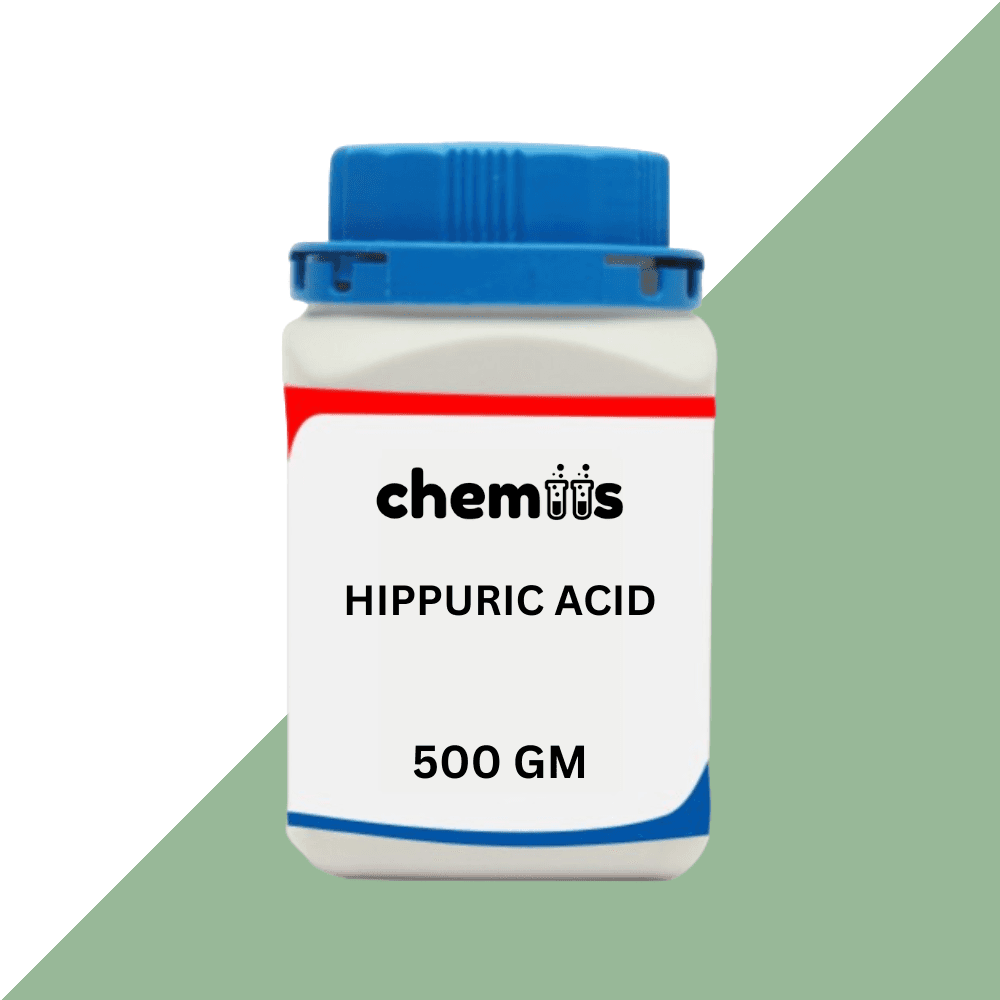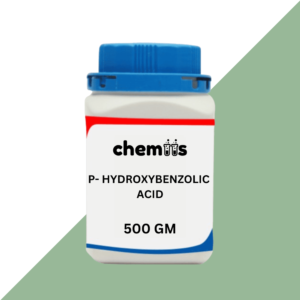Hippuric Acid (C9H9NO3) is an organic compound naturally present in the human body and other mammals. It is the result of the body’s process of detoxifying benzoic acid, which occurs when benzoate (often derived from dietary sources like fruits and vegetables) is conjugated with glycine in the liver. While it is commonly known for its presence in urine and as a biomarker of detoxification, Hippuric Acid also has several applications in various industries, including medicine, chemical synthesis, and environmental studies.
Hippuric Acid has a white, crystalline appearance and is soluble in water and alcohol. It has been widely studied due to its physiological role in human metabolism and its potential applications in pharmaceuticals, agriculture, chemicals, and toxicology. It is also studied for its potential to detoxify harmful substances in the body, as well as its usefulness in chemical analyses and biological research.
Applications of Hippuric Acid
- Medical and Pharmaceutical Uses:
- Detoxification and Biomarker:
Hippuric Acid is primarily known as a detoxification byproduct. It is formed when the liver conjugates benzoic acid with glycine as part of the body’s natural process to eliminate toxins. As a result, Hippuric Acid levels in urine can be used as a biomarker for the body’s detoxification process. This makes it useful in clinical diagnostics to assess liver function and kidney health. - Drug Metabolism Studies:
Hippuric Acid is also used in pharmacological research as a marker for drug metabolism. Researchers study the excretion of Hippuric Acid to understand how the body processes and eliminates pharmaceutical compounds, providing valuable insights into the pharmacokinetics and toxicity of various drugs. - Treatment for Benzoate Toxicity:
In rare cases of benzoate poisoning or exposure to benzoic acid, Hippuric Acid supplementation may be used to facilitate the detoxification process. It assists in reducing the toxic effects of benzoic acid by promoting its conversion to a less toxic, water-soluble form that can be excreted by the kidneys.
- Detoxification and Biomarker:
- Chemical Synthesis:
- Intermediate in Organic Synthesis:
Hippuric Acid serves as an intermediate in the synthesis of other organic compounds. It can be used in the manufacture of aromatic chemicals, flavors, and fragrances. Hippuric Acid’s structure makes it a useful building block for synthesizing other benzoate derivatives and related compounds used in industrial applications. - Production of Salts and Derivatives:
Hippuric Acid is used to synthesize salts (such as potassium hippurate) and other derivatives. These compounds have applications in chemical industries, particularly for use in manufacturing cleaning agents, solvents, and other chemical formulations. For example, hippuric acid salts are sometimes used in agricultural chemicals as plant growth regulators and pesticides.
- Intermediate in Organic Synthesis:
- Toxicology and Environmental Studies:
- Biomarker for Environmental Exposure:
Hippuric Acid is a well-known biomarker for exposure to xenobiotics—foreign chemicals like industrial pollutants and pesticides. Measuring levels of Hippuric Acid in urine can provide researchers with insights into environmental exposure to harmful substances, especially in industrial or agricultural settings where workers might be exposed to aromatic hydrocarbons. - Urinary Excretion Studies:
The presence of Hippuric Acid in the urine is commonly used in toxicological studies to monitor the body’s response to toxic chemicals. It is particularly useful for tracking the detoxification of solvents and industrial chemicals that may be absorbed into the body. - Research in Industrial Hygiene:
Hippuric Acid is used in occupational health studies, particularly for assessing worker exposure to chemicals like toluene and xylene, which can lead to benzoic acid formation in the body. Elevated levels of Hippuric Acid in the urine are often linked to occupational exposure to such volatile organic compounds (VOCs).
- Biomarker for Environmental Exposure:
- Agriculture and Veterinary Medicine:
- Animal Feed Additives:
Hippuric Acid can sometimes be included in animal feed as an additive to improve the overall health and metabolic function of livestock. As a metabolic byproduct, it can assist in detoxifying benzoates or other potentially harmful substances ingested by animals, ensuring better animal health. - Pest Control Applications:
In some agricultural applications, salts of Hippuric Acid, such as potassium hippurate, are used as pesticides or herbicides. These compounds can help in controlling plant diseases or inhibiting pest activity, though they are generally not as widely used as synthetic alternatives.
- Animal Feed Additives:
- Food and Beverage Industry:
- Preservative in Processed Foods:
Although not directly used as a preservative, Hippuric Acid’s metabolic pathway is often linked to the breakdown of food additives like benzoates found in processed foods. By studying Hippuric Acid levels, food manufacturers can monitor the breakdown and detoxification of these preservatives, ensuring the safety of processed food products. - Flavor Compound Research:
Research into food flavorings may also explore Hippuric Acid, as it is involved in the breakdown of benzoic acid derivatives, which are often used as flavoring agents in food and beverages. Understanding its metabolism can help improve food safety and flavor profiles in processed food products.
- Preservative in Processed Foods:








Sandeep Nair (verified owner) –
No leakage or damage.
Asha Fernandes (verified owner) –
User-friendly website.
Vishal Yadav (verified owner) –
No complaints at all.
Tanvi Purohit (verified owner) –
Fast response to queries.
Namrata Bansode (verified owner) –
Consistent on every order.
Aditya Rawat (verified owner) –
Just as expected.
Avni Kapoor (verified owner) –
Great for bulk purchase.
Namrata Bansode (verified owner) –
All items intact.
Kripa Mehta (verified owner) –
Trustworthy platform.
Shreyas Rao (verified owner) –
Repeat customer, always happy.
Deepansh Bedi (verified owner) –
Quick and safe delivery.
Vishal Yadav (verified owner) –
No complaints at all.
Arjun Reddy (verified owner) –
Products are exactly as described.
Asha Fernandes (verified owner) –
Item delivered safely.
Lokesh Rathi (verified owner) –
Clear product details.
Tanvi Purohit (verified owner) –
Website is easy to navigate.
Jayant Mishra (verified owner) –
Very helpful support team.
Devika Pillai (verified owner) –
Consistent quality.
Nandini Kaul (verified owner) –
On-time and well-packed.
Neha Kaur (verified owner) –
Very helpful support team.